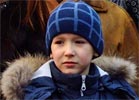


ChessBase 17 - Mega package - Edition 2024
It is the program of choice for anyone who loves the game and wants to know more about it. Start your personal success story with ChessBase and enjoy the game even more.
First of all, Konstantin and his father Evgeny Savenkov gave us some additional information on the people in the picture below.

Alina Kabaeva, Anatoly Karpov, Vasily Livanov, Viktor Yerofeyev and Konstantin
Savenkov (front)
Alina Kabaeva, 23, one of the most decorated gymnasts in the history of rhythmic gymnastics, started off in Tashkent, Uzbekistan, in 1987 at the age of four. In 1998 at the age of 15 she won the European Championships. In 1999 Alina became the European Champion for the second consecutive year and was awarded the world title in Osaka, Japan. She went on to win a total of five titles at the European Championships and another world title in 2003 in Budapest, Hungary. At the 2004 Athens Olympics she won the Gold Medal. In October 2004 she announced her retirement from the sport. Now Alina is an influential public figure, TV presenter and active charity worker.
Viktor Erofeev (or Yerofeyev) is a well-known Russian author. He was born in Moscow in 1947. After graduating from Moscow State University he became a literary critic and columnist. His most famous work, Russian Beauty, has been published in the US and France. Victor frequently appears on Russian television as a TV presenter on Culture TV channel.
Vasily Livanov is a famous actor who has played Sherlock Holmes in many Russian films.

Sergey Tselebrovsky is the current world champion in ice sculpting. He won The World Ice Art Championships in Alaska for the fourth time in 2006. Sergey has worked across the world, winning numerous competitions in Russia and throughout Europe. His work has been displayed in Belgium, Canada, Holland and Finland. He was the first sculptor to work in the North Pole. Sergey is 46 years old and was born in Krasnoyarsk.

The press and TV waiting for the start of the Ice Chess game in Moscow

Anatoly Karpov interviewed by Russian TV

The pieces, built to last for the duration of a game in the +5°C Moscow
winter

The game is undeer way, with Karpov doing commentary

Konstantin Savenkov, the chess prodigy, is the main initiator of the moves

Konstantin tries his hand at ice sculpturing
After yesterday's report a number of readers wrote in to complain that we had not provided the moves of the game. We found a general description of it in the Guardian, in a column by Steven Moss.

The British team, captained by Nigel Short (middle), with chess prodigy
Darius Parvizi-Wayne, Peter Ackroyd (right), author of biographies of T.S. Eliot,
Charles Dickens, Thomas More, William Blake and William Shakespeare, and Steven
Moss (left), columnist and chess champion of the Guardian.
In the Guardian Unlimited Steven writes:
The toss for choice of colour was in Moscow and the Russians won it – cue early accusations of dirty tricks. Karpov's team, playing white with the advantage of first move, opted for an aggressive opening. I was out of my depth by move four, but Darius, with a few nods and winks from his coach, kept a steady nerve as a team of youthful chess enthusiasts slid the heavy ice pieces across a board rapidly filling with water.
Russia fielded Anatoly Karpov, the former world champion; Konstantin Savenkov, the Russian under-seven champion; and a gymnast and DJ of unknown chess strength. The Russians were in Moscow's Pushkin Square, while we braved a blustery dawn in Trafalgar Square – the game had to be played early before the giant pieces, sculpted out of ice in the shape of London and Moscow landmarks, melted. Global warming is a threat to ice chess, too.
Our brief early advantage disappeared, the Russians – traditionally the strongest chess country – began to exert control and Short had to admit we were being outplayed. But we had one crucial advantage – the timing of the 30-minutes-a-side game was being coordinated in London. "Stalin said the only important thing was who counted the votes," explained the wily Short. "Here, the important thing is who controls the clock."
Our team captain, grandmaster Nigel Short,... was a benign presence rather than the controlling genius. "Maybe the Russians' queen will dissolve before they get mate," was one of his less helpful interventions.
The full notation was provided by Konstantin Savenkov, who scanned it for us:

Moscow - London [C57]
Ice Chess London, 11.01.2007
1.e4 e5 2.Nf3 Nc6 3.Bc4 Nf6 4.Ng5 Bc5 5.Bxf7+ Ke7 6.Bd5 d6 7.0-0 Bg4
8.Qe1 Nxd5 9.exd5 Nd4 10.c3 Ne2+ 11.Kh1 h6 12.Ne4 Bb6 13.f3 Nxc1 14.fxg4 Nd3
15.Qg3 Nf4 16.d4 g5 17.Nbd2 Qg8 18.dxe5 dxe5 19.c4 Bd4 20.Qb3 Qg6 21.Qxb7 Qb6
22.d6+ Kd7 23.Qxc7+ Qxc7 24.dxc7 Kxc7 25.Rab1 Rhf8 26.Nf3 Rad8 27.b4 Ne2 28.c5
Rf4 29.Nd6 Rxg4 30.Nxd4 exd4 31.Rf7+ Kc6 32.Rxa7 d3 33.Ra3 Rd4 34.b5+ Kd5 35.Rd1
d2 36.Nf5 Kxc5 37.Nxd4 ½-½. White had a winning position,
but Black (London) was winning on time. So accepting the draw offer from Moscow
was an acceptable decision for both sides. [Click
to replay]

Incidentally Konstantin told us that he no longer wants to be a businessman in the oil industry when he grows up – as we reported his bio in yesterday's story. His current ambition is to be a juggler!